The English Romantic poets
The English Romantic poets
The English Romantic poets
-
Hannah
-
Hannah

Transformed the world? Yes, really. The Romantic movement of the first half of the 19th century in England created a new way of writing, and of perceiving the world. Historian Peter Ackroyd writes that Coleridge and Wordsworth were:
truly the pioneers in what has since become the ‘back to nature’ movement. Anyone who yearns to walk beside the sea, or to ascend a mountain, or to row across a lake, owes a great debt to these two English poets.
Nature was of great importance to the Romantics and was a core theme in their poems. The natural world was, wrote Coleridge in ‘Frost at Midnight’, the ‘Great universal Teacher’; from looking around at the world, at the moon, the sea, a windswept moor, a tranquil lake, one could find inspiration and solace.
The poets of this movement were dreamers, lyrical and spiritual. They were interested in the ‘sublime’, which meant inspiring a reader to have experiences beyond the ordinary. They were immersed in emotion as they wrote and wanted the reader to feel as they read. Wordsworth explained it thus:
[P]oetry is the spontaneous overflow of powerful feelings: it takes its origin in emotion recollected in tranquility: the emotion is contemplated till, by a species of reaction, the tranquility gradually disappears, and an emotion, kindred to that which was before the subject of contemplation, is gradually produced, and does itself actually exist in the mind.
In order to reach readers and really connect with them, traditional conventions for poems were rejected; elitist, highbrow writing was abandoned in favour of everyday language with which ordinary people could engage – ‘the language really spoken by men’, as Wordsworth put it.
These poets were breaking new ground, and making ripples in the arts that would soon build into waves. To this day, their poetry endures as beautiful and soulful and thought-provoking – and, for a writer like me, deeply inspiring.
Here they are, the key Romantic poets, six men who changed the world, along with my favourite lines from each.
William Blake
8 November 1757 – 12 August 1827
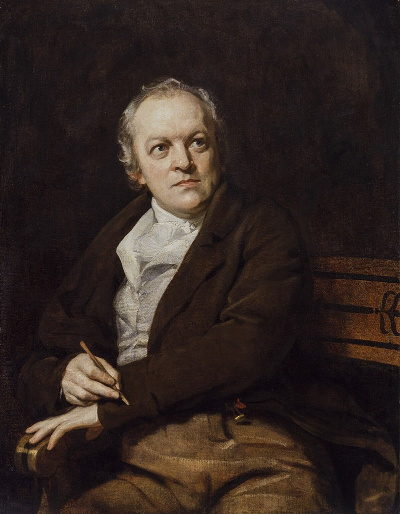
Three interesting facts:
- He was a professional engraver.
- He painted, and studied at the Royal Academy.
- He was commissioned to produce artworks for Dante’s Divine Comedy.
From ‘The Clod and the Pebble’:
Love seeketh not Itself to please,
Nor for itself hath any care;
But for another gives its ease,
And builds a Heaven in Hell’s despair.
From ‘Auguries of Innocence’:
To see a world in a grain of sand,
And heaven in a wild flower,
Hold infinity in the palm of your hand,
And eternity in an hour.
William Wordsworth
7 April 1770 – 23 April 1850
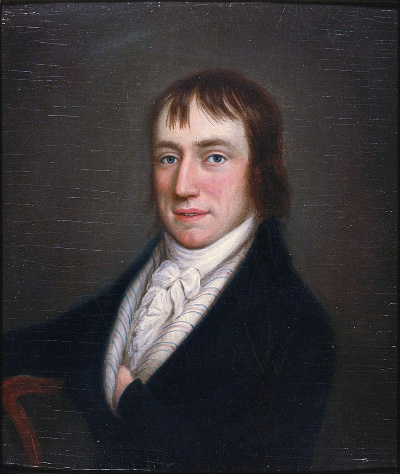
Three interesting facts:
- He was born in the Lake District, attended university in Cambridge, and travelled extensively in France, Switzerland and Italy.
- He was very close to his sister, Dorothy, who was also a poet.
- He was the British Poet Laureate from 1843 until his death. He was the only laureate to write no official poetry during his tenure.
From ‘She Was a Phantom of Delight’:
She was a Phantom of delight
When first she gleam’d upon my sight;
A lovely Apparition, sent
To be a moment’s ornament:
Her eyes as stars of twilight fair;
Like twilight’s, too, her dusky hair;
But all things else about her drawn
From May-time and the cheerful dawn;
A dancing shape, an image gay,
To haunt, to startle, and waylay.
From ‘I Wandered Lonely as a Cloud’:
I wandered lonely as a cloud
That floats on high o’er vales and hills,
When all at once I saw a crowd,
A host, of golden daffodils;
Beside the lake, beneath the trees,
Fluttering and dancing in the breeze…
Samuel Taylor Coleridge
21 October 1772 – 25 July 1834
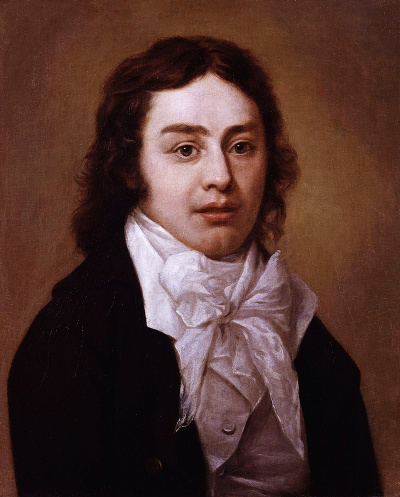
Three interesting facts:
- He was the youngest of ten children.
- Coleridge and Wordsworth were friends, and they published a volume of poetry together called Lyrical Ballads, which launched the English Romantic movement.
- Coleridge’s The Rime of the Ancient Mariner was an inspiration for Mary Shelley in Frankenstein.
From ‘What If You Slept’:
What if you slept
And what if
In your sleep
You dreamed
And what if
In your dream
You went to heaven
And there plucked a strange and beautiful flower
And what if
When you awoke
You had that flower in your hand
Ah, what then?
From ‘Love’:
All thoughts, all passions, all delights,
Whatever stirs this mortal frame,
All are but ministers of Love,
And feed his sacred flame.
George Gordon, Lord Byron
22 January 1788 – 19 April 1824
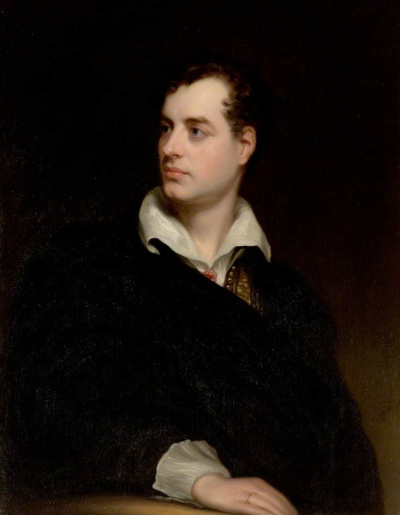
Three interesting facts:
- He had club foot, and walked with a limp, which made him miserable.
- He had several affairs with married women.
- He fought against the Ottoman Empire in the Greek War of Independence, and became a national treasure to the Greeks for his heroics.
From ‘She Walks in Beauty’:
She walks in beauty, like the night
Of cloudless climes and starry skies;
And all that’s best of dark and bright
Meet in her aspect and her eyes…
From Don Juan:
But words are things, and a small drop of ink,
Falling like dew, upon a thought, produces
That which makes thousands, perhaps millions, think;
’T is strange, the shortest letter which man uses
Instead of speech, may form a lasting link
Of ages; to what straits old Time reduces
Frail man, when paper – even a rag like this,
Survives himself, his tomb, and all that’s his.
Percy Bysshe Shelley
4 August 1792 – 8 July 1822
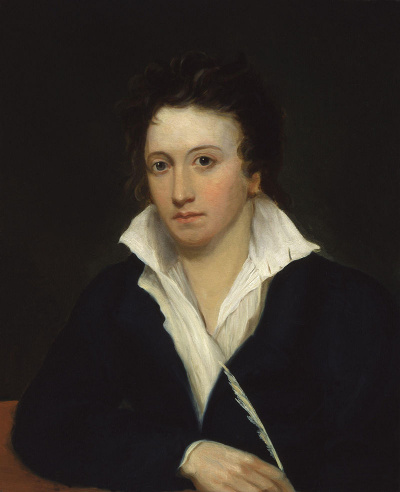
Three interesting facts:
- He was expelled from Oxford University for being radical.
- His second wife was Mary Shelley, author of Frankenstein.
- He drowned in a sudden storm, and his grave bears an inscription from Shakespeare’s The Tempest: ‘Nothing of him that doth fade / But doth suffer a sea-change / Into something rich and strange.’
From ‘Love’s Philosophy’:
See the mountains kiss high heaven,
And the waves clasp one another;
No sister-flower would be forgiven
If it disdain’d its brother;
And the sunlight clasps the earth,
And the moonbeams kiss the sea –
What are all these kissings worth,
If thou kiss not me?
From ‘Music, When Soft Voices Die’:
Music, when soft voices die,
Vibrates in the memory –
Odours, when sweet violets sicken,
Live within the sense they quicken.
Rose leaves, when the rose is dead,
Are heaped for the belovèd’s bed;
And so thy thoughts, when thou art gone,
Love itself shall slumber on.
John Keats
31 October 1795 – 23 February 1821
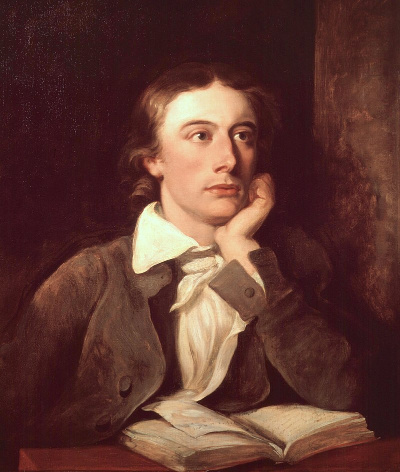
Three interesting facts:
- He studied medicine at Guy’s Hospital, London.
- He was in love with a lady named Fanny Brawne, but their love was never consummated.
- He died aged twenty-five, just four years after first being published.
From ‘To Autumn’:
Season of mists and mellow fruitfulness
Close bosom-friend of the maturing sun
Conspiring with him how to load and bless
With fruit the vines that round the thatch-eaves run;
To bend with apples the moss’d cottage-trees,
And fill all fruit with ripeness to the core…
And finally, a full poem: ‘Bright Star, Would I Were Stedfast as Thou Art’ – written by Keats in the knowledge that he was dying:
Bright star, would I were stedfast as thou art –
Not in lone splendour hung aloft the night
And watching, with eternal lids apart,
Like nature’s patient, sleepless Eremite,
The moving waters at their priestlike task
Of pure ablution round earth’s human shores,
Or gazing on the new soft-fallen mask
Of snow upon the mountains and the moors –
No – yet still stedfast, still unchangeable,
Pillow’d upon my fair love’s ripening breast,
To feel for ever its soft fall and swell,
Awake for ever in a sweet unrest,
Still, still to hear her tender-taken breath,
And so live ever – or else swoon to death.